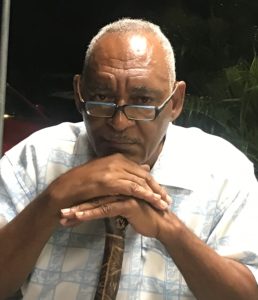
I asked a friend of mine some days ago when we were on the Bayside in Gallows Bay—where they used to hang the run-away slaves—eating fungi and fish with okra on the side, why is it that we in this territory are so nonchalant about the pending global food crisis?
He said to me, “That’s the way we are about everything.”
The fact that we grow no significant food to supplement our consumptions, left me wondering, is it because we are reliant on the United States that we believed we are beyond starvation?
I thought, with the pending hope of producing a constitution of our own, the notion of “self-reliance’ would have been a consciousness implanted within our psyche. But in this case, it seemed like a passing black cloud. It is said that the global food crisis has reached the U.S. as big retailers began rationing sales of rice in response to bulk purchases by customers alarmed by rocketing prices because of COVID-19.
How many of us have gone shopping in our local supermarkets lately and shocked to see the kind of prices that we are now paying for food? And yet, we act like it’s nothing. I read recently, where beginning this year, rice-producing countries have imposed limits on exports to keep domestic prices down. What are we doing? Some time ago in Haiti, looting and rioting for basic foods left at least 60 people dead and forced the resignation of the prime minister. In Guyana, it is said that an 80 percent rise in the price of rice and a 50 percent increase in the cost of chicken triggered protests and a strike by sugarcane workers.
It would be interesting to see the Virgin Islands Bureau of Economic Research conduct a comprehensive survey in our local shops and supermarkets, what kind of increase they would observe since this food crisis started?
Where some governments are urging people to cultivate idle land in preparation, or backyard gardens, we somehow don’t see the impetus of this advice. In one report, it is said that the amount of U.S. grains currently stored for the following seasons were the lowest on record, relative to consumption.
Why am I so concerned? Why shouldn’t I do like the rest of us and just bask in the rays of the sun, dance, and prance and gobble up the rest of the food and forget about friends, neighbors, and other family members? Well, I am benevolent, a social creature, a believer in the grassroots way of life. Moreover, I am no procrastinator, for as it is stated without reservation, a new crisis is emerging—a global food catastrophe that will reach further and be more crippling than anything the world has ever seen.
The fundamental reality here, particularly from the perspective of the Virgin Islands, is that we import 99.9-percent of our food; and the global food crisis is currently concentrated primarily where people must buy all of their food and at the mercy of volatile markets. It is also a fact that many families—those we are not on SNAP—are using as much as 75-percent of their income for food.
And so, my question stands, is agriculture in the Virgin Islands, a dream deferred? Ironically, I am reminded of what the late African American poet Langston Hughes said:
What happens to a dream deferred?
Does it dry up
like a raisin in the sun?
Or fester like a sore—
And then run?
Does it stink like rotten meat?
Or crust and sugar over—
like a syrupy sweet?
Maybe it just sags
like a heavy load.
Or does it explode?
Winston Nugent
Editor’s note: Winston Nugent is a poet, short story writer, playwright and journalist living on St. Croix.






The U.S. Virgin Islands climate change vulnerability and risk assessment report, prepared in 2019 by the University of the Virgin Islands and the University of the West Indies, mentions the sensitivity of the agriculture sector to climate change and storms in Section 4.5, page 58. The report, which focuses on livestock and crop farming in the Territory, does not address two key issues.
First, agriculture has to be seen within the context of food security. If most of the food consumed in the Territory is produced elsewhere, then access to food is dependent to a large degree on the conditions in our source markets. Are those source markets vulnerable to climate change, storms, and other disruptions? If so, the vulnerability of the U.S. Virgin Islands should reflect the vulnerability of our source markets and the associated transportation links.
The second key issue is the actual structure of the agriculture sector. In terms of local production levels, the question of the sources of critical inputs become important. While it may be clear that pesticides, fertilizers, and equipment are sourced off island, are we producing locally all of the seedlings and other seed stock that we use? If we are not, then importation of seed stock becomes another area of vulnerability. This could also be an area of growth.
The many discussions about agriculture in the Territory have not resolved the issues of economic viability and vulnerability of the sector. Maybe the coming food shortage suggested by Mr. Nugent will provide the sense of urgency necessary for an in-depth analysis, substantive debate, and sector development plan.